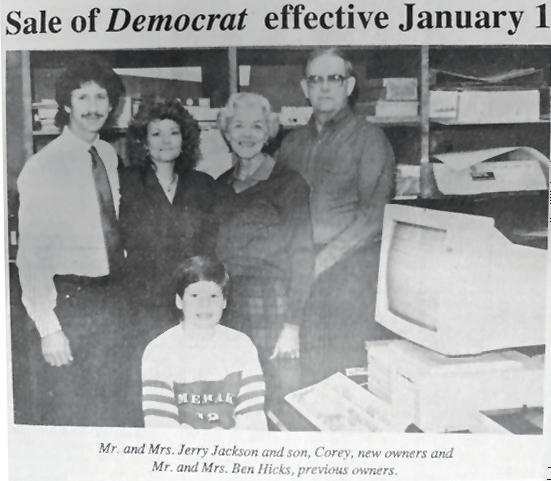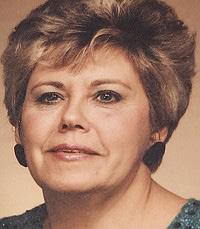
Last chance to enter 2025 APA Advertising Contest this Friday 4 95th Arkansas General Assembly Legislative Report 9


Last chance to enter 2025 APA Advertising Contest this Friday 4 95th Arkansas General Assembly Legislative Report 9
Vol.20 | No. 9 | Thursday, February 27, 2025 | Serving Press and State Since 1873
After graduating from high school in May 1973, Jerry Jackson went to work at the local England Democrat and has been there ever since.
Over the years, Jackson has faced and overcome the countless challenges to small town weeklies and his publication now stands as the only newspaper in Lonoke County.
Jackson remembers that prior to his newspaper job, he was unsuccessful in his application at Remington Arms in Lonoke. Possessor of what may be described as a wry sense of humor, he said, “I guess maybe I didn’t give the right answer on one of the questions.”
Terry Duck, a friend of one of Jackson’s brothers, was working at the Democrat at the time and suggested he apply there. He got the job – and he’s still there 52 years later. Duck went on to a long career in the newspaper industry, working at nearby Stuttgart, then to Northwest Arkansas and finally to Las Vegas, where he retired.
Jackson is a good typist, registering 7580 words a minute, and that was a factor in landing the newspaper position. He also was an honor graduate at England High School.
Jackson grew up in what might be described a “tough” situation. He was one of seven children, six boys and a girl. His father died when he was only five and the family moved to the rural community of Central, five miles northeast of England, to be closer to his mother’s family.
The family, including his mother, Bessie Jackson, did farm work in the rural community and lived in a two-bedroom house. She also worked in the school cafeteria. “We were just country folks, and we worked more than we had time to think about things,” Jackson said. As a result, the family didn’t particularly see themselves as disadvantaged. “You just
knew everyone was doing the best you could at the time.”
Jackson remembers the family had no running water in the house until he was in the eighth grade. He attended a rural school near his home until he started in England in the third grade.
With that background, Jackson acknowledges that he entered his job at the newspaper as something of an introvert. “Growing up, if a relative came in one door, I was heading out the other one,” he said.
Over time, he was able to overcome that shyness (and what he considered his lack of qualifications) to become an integral part of the community. “I felt like I had made a step up in life and it was a good place to be. And it was warm in the winter and cool in the summer.

Continued from page 1
“At the newspaper, I had an incentive to actually become a part of the community and interact with people.”
At one point in the 1990s, he was elected president of the local Chamber of Commerce. “That was something I never thought I would do,” he said, particularly remembering the public speaking aspects of the position.
Jackson believes people in the community were “proud of me to get into this position, knowing where I had come from. In essence, I guess you could say I had grown up on a dirt road and pulled myself up by the bootstraps.”
Ben W. Hicks owned the newspaper when Jackson landed the job. Ironically, the newspaper had switched to offset printing just a few weeks before but still maintained a vital job printing business. After he had been there a few years, Hicks suggested that Jackson could acquire the publication through regular mortgage payments at some point. That happened in 1989, and Jackson spent 16 years satisfying the agreement.
Following his purchase of the newspaper, Jackson said he “felt extremely blessed by the amount of goodwill and acceptance that the business community and populace immediately displayed to ensure my success.
“My goal was to give everyone who wanted it a venue to publicize their accomplishments, et cetera – I was one of them. In addition to helping tell their story, I was welcomed at every community event and attended most when I had the time.”
typing, giving him time to cover events in the community.
For the past four years, Jackson has worked alone at the newspaper. An exception was last summer, when a college student assisted briefly. The Democrat remains in the same building in which he started, a block off the main street.
Jackson acknowledges that his vitality and enthusiasm have waned in recent years. “After 50 years, you lose some of your get up and go,” he said. He primarily publishes items that are submitted, and the newspaper, which is printed in Jacksonville, usually runs six pages each week.
“You’ve heard of lame duck politicians,” Jackson said. “I guess in some ways I am kind of a lame duck editor,” he said with a laugh.

Jackson was part of a staff of four when he first started at the newspaper and that level of employees continued for some time. During his earlier years at the newspaper, he also worked with the press crew for the late publisher Cone Magie a couple of nights a week at Cabot, where the Democrat was printed. At the time, Jackson lived near the Jacksonville airbase with his first wife, so it was convenient for him to work part-time at Cabot.
After he became the owner, Jackson had several experienced employees working with him, including Evelyn Adams and Brenda Lynn. They primarily were involved in bookkeeping and
Looking back, Jackson said the most rewarding aspect of his work was publishing items in the newspaper that “made people happy,” such as engagements, weddings and births. “People wanted those things to be seen, and we were able to do it.”
On the other hand, it pained him to have to print the “bad things” that happen in the life of a community. “You are sad for people at those times,” he said.
He also remembers covering criminal events, with law enforcement sometimes providing him with a flak jacket for protection. “Now the police don’t want you to know anything,” he said.
Jackson considers it a compliment that one of his past friends in journalism, the late Bill Rutherford, once told him – “you are kind of an old-school editor.”
The biggest challenge to community newspapers, in Jackson’s opinion, is the emergence of social media. “The newspaper is sometimes four or five days late on the news,” he said. “The other big factor is that advertising has dried up.”
There also is a very visible declining subscription base. “Many small towns, as mine, are communities which several generations have called home,” he said. “As our older generations, very loyal readers and subscribers, were always faithful to clip articles about their family and friends for a scrapbook or just to store away the edition or tear sheet and pull years later for nostalgia – the younger ones
Continued from page 1
have come to depend on the current social media world.
“They are content to see things once on their electronic devices and then move on to whatever catches their attention. They are obsessed with instant news headlines compared to the ‘days old’ delivery of the local paper. I have several subscribers who still purchase yearly subscriptions for their children/grandchildren who have made homes away from England.”
England is “not what it used to be,” Jackson notes, and residents have the option of driving 20 miles or so in three different directions to shop in larger communities.
“Our community’s proximity to larger cities offering more amenities has been detrimental to our community’s growth –industrial and residential. Many businesses have stopped advertising in print venues and started to send a larger portion of their budgets to internet ad purchases.”
Jackson said England had a shoe factory that helped the local economy when he first began working at the newspaper. In more recent days an oil field service company employed local residents, but it went out of business in the face of larger competitive firms.

The local school is the largest employer now, along with a relatively new Harps supermarket.
The population of England has declined in recent years to its present total of about 2,500. Despite the decline, Jackson said there still is a strong sense of community spirit. “I don’t think England is very different from any other small community. If a community member or someone from their family experiences a tragedy of any kind, everyone makes an effort to provide some form of assistance as needed. Some of those tragedies I experienced firsthand as I served 13 years as a volunteer firefighter/first responder. I feel extremely blessed to have been and continue to be an integral part of the community.”
Jackson has supplemented his income over the years with outside work, including a period in which he undertook a significant farming operation of some 350 acres. He also mowed lawns over the years and for the past five years has done significant work of that nature at the Land’s End Plantation located nearby in rural Pulaski County.
“I love gardening and mowing,” Jackson said. “I guess you could say it’s kind of been my therapy.”
Jackson said his last paycheck from the newspaper was written on April 29, 2022. He hasn’t cashed it, keeping it as something of a souvenir. In addition to his mowing work, he has been drawing Social Security for the past three years.
The last several years have been especially difficult for Jackson. His wife, Shawn Youngblood Jackson, was in very bad health for a couple of years and required a lot of his attention before dying in January 2023. Jackson also helped care for a brother, who died in October 2024. “It has really been a struggle,” he said.
Jackson, who lives six miles north of England in the Keo community, has three children, three grandchildren and three great-grandchildren.
He enjoyed deer hunting in the past, but now mainly focuses on his work at Land’s End and helping several neighbors with their mowing.
As for the future, he is taking it “one year at a time,” advising subscribers not to purchase multi-year subscriptions. “Declining revenue sources and the ever-increasing cost of newspaper production-distribution expenses have created an atmosphere where I have to do more with less – requiring me to wear all the hats for several years now.”
Another factor he cites – “five decades of wear and tear!”
The owners of Land’s End want him to work there full-time, but he has not made that decision.
“I just don’t know when I’m going to wake up and say I’ve had enough,” he said. “One really positive thing right now is that my health is good. I still want to see the paper succeed as well as it can. I’m not trying to be a hero, but I’m still very loyal to the community.”

NEWSPAPERCONTEST.COM/CONTESTS/ARKANSASPRESSASSOCIATION.ASPX

Nancy Violette (Snavely) Ray died November 22, 2024. She was 83.
Ray was born January 10, 1941 to P.H. and Mary Watson Snavely. Her most recent job was working in the office of the former Arkansas Patriot in Jacksonville. She married John M. “Pete” Ray in 1971. She moved to Tennessee in 2010 upon her husband’s death.
She is preceded in death by her husband, brothers Henry, John and Charlie Snavely, sisters Catherine Browder and Mary Alice Snavely Griffin, brothersin-law Sam Spears and Tom Griffin and sister-in-law Barbara Snavely.
She is survived by brother Jim Snavely (Peggy), sister Ann Spears, sisters-in-law Rosemarie Snavely and Emmalyn Snavely, brothers-in-law Kenneth “Cody” Ray (Pat) and Wayne Ray (Tammy). A service will be held March 24 at noon at Arkansas State Veterans Cemetery, 1501 W. Maryland Ave., North Little Rock.

The deadline to enter the annual APA Better Newspaper Advertising Contest is this Friday, Feb. 28. Member newspapers and media members are encouraged to present their creativity and hard work from the 2024 calendar year.
There are 20 categories across four divisions in this year’s contest, including single ad, multiple advertiser ad, best advertising special section, most original idea, use of humor in advertising and more. Winners will be recognized at the annual APA Advertising Conference on April 10-11 in Little Rock.
For complete contest rules and instructions, visit https:// newspapercontest.com/Contests/ArkansasPressAssociation.aspx.
If you have questions about the contest or the online submission process, contact Terri Cobb at (501) 374-1500 or email terri@ arkansaspress.org.
Divisions range from traditional print and broadcast to podcasts and communications.
All finalists will be honored at the Arkansas Pro SPJ annual meeting and awards ceremony in July.
Deadline to enter is March 3. Enter at Arkansasspj.org or scan the code below.



Arkansas SPJ has proudly partnered with to award
The White House announced plans to dissolve the United States Postal Service’s Board of Governors in an effort to return the service to a cabinet department.

According to the National Newspaper Association, the move would return the USPS to a “pre-1970” state. The move comes as the Department of Government Efficiency (DOGE) sorts through federal agency systems resulting in several terminations, some already being challenged.
The NNA issued a statement on the proposed change, saying: “Many issues
must be resolved before such a move, including its legality. We have no indication that the White House intends to suspend mail service entirely, only that it wants to resolve the USPS’s many solvency issues. How and whether that can happen remains to be seen. But it is too soon to panic.”
Amid the uncertainty, Postmaster General Louis DeJoy has announced his resignation and called for the USPS to begin searching for his replacement. The agency made the announcement last Tuesday, the day after he sent a letter to the Board of Governors stepping down, as reported by USA Today - the Times Reporter.
“As you know, I have worked tirelessly to lead the 640,000 men and women of the Postal Service in accomplishing an extraordinary transformation,” DeJoy wrote in the letter. “We have served the American people through an unprecedented pandemic and through a period of high inflation and sensationalized politics.”
DeJoy was appointed during the first Trump administration in 2020. During his tenure he developed the Delivering for America plan, a 10-year plan to modernize USPS operations and stem losses. Published
March 2021, the plan called for over $40 billion in capital investments over the next decade, including $20 billion towards the agency’s mail and package processing network and another $19 billion towards its retail and delivery network. Another $2 billion would go toward technology upgrades.
“Louis DeJoy has steadfastly served the nation and the Postal Service over the past five years,” said Amber McReynolds, chairwoman of the Board of Governors, in a news release. “The Governors greatly appreciate his enduring leadership and his tireless efforts to modernize the Postal Service and reverse decades of neglect.”
With more changes looming, the NNA suggests industry people to prepare by delivering any mail possible to a local post office and converting any long-distance subscribers to an electronic subscription. The “end-to-end” network is most at risk with the possible change in governing structure, according to NNA, which includes subscribers beyond Zone 3.
For more information, the NNA Foundation offers a Postal Hotline for members and will hold another session on Exceptional Dispatch later in the year.
Arkansas Press Women has launched its 2025 scholarship contest, offering aspiring journalists and communicators a golden opportunity to shine.
Arkansas Press Women awards a $1,000 scholarship each spring to an undergraduate student – male or female – who is attending an Arkansas college or university and is planning a career in mass communication, journalism or a related field.
Funding for this scholarship comes from APW’s Maudine Sanders Education
Fund. Sanders, a previous owner of the Springdale Morning News, was a long-time member of Arkansas Press Women before her passing in 2011.
The deadline to apply for the 2025 scholarship is March 10, 2025. The scholarship winner will be honored during the APW annual award ceremony in the spring. Visit the APW website to apply.
For more information, contact Angie Faller, scholarship chair, at amfaller@ualr. edu





Ida Jeanette Sanders Daniels died February 8 in Little Rock. She was 84. She was born on January 17, 1941 to Jim Sanders and Laura “Ruby” Jeanette In addition to a long career in fashion and design, she worked as a newspaper journalist Malvern.
She is preceded in death by her daughter Sarah “Becky” Duke Camp, siblings Charles Henry “Bubba” Sanders, Sr., Margaret Selvey, Betty Sue Thomas, Peggy Bryant and Roger Sanders. She is survived by her sister Clarice “Reecy” Wetmore and brother Larry Joe (Kim) Sanders.
A memorial service was held at Highland Valley United Methodist Church.
The Arkansas Newspaper Connection is a weekly newsletter published by APA connecting freelance and independent writers, editors, photographers and designers with Arkansas newspapers in need. Lists available job openings and other opportunities at Arkansas newspapers and associate member organizations. Send your listings to info@arkansaspress.org.
A lawsuit against a Mississippi newspaper has been dropped. The libel suit, filed by the city of Clarksdale (Mississippi) board of commissioners, came about after an editorial criticizing local leaders was removed from the newspaper’s site by a judge. The case against the Clarksdale Press Register has garnered attention from First Amendment advocacy groups and media outlets, including the National Press Club and the Reporters Committee for Freedom of the Press, before it was resolved Monday, as reported by Editor & Publisher Magazine.
The February 8 editorial, “Secrecy, Deception Erode Public Trust,” featured criticism against the city for not sending the newspaper notice about a City Council meeting on a proposed tax on alcohol, marijuana and tobacco. Chancery Judge Crystal Wise Martin issued the restraining order against the Press Register last week in connection with the editorial.
The judge must still dismiss the order removing the editorial from the newspaper’s site, which the city has also asked her to do. A hearing was originally set for February 27.
“It’s still very, very wrong what they did and it awakened the entire First Amendment community nationally, which is very encouraging,” said Wyatt Emmerich,
president of Emmerich Newspapers, the parent company of the newspaper. “I’m really excited to see how all these people rallied around us to protect our rights.”
Emmerich made an offer to write a clarification, but took the offer “off the table” after the suit was filed and the judge’s order was handed down.
The offer was intended to clarify that the council said the lack of notification was not a deliberate attempt to hide the meeting, according to a text message between Emmerich and the city attorney.
The text also offered clarification for a sentence questioning a “kick-back from the community,” which was meant to say “push back from the community.”
Clarksdale Mayor Chuck Espy told the Associated Press he asked commissioners to drop the suit to accept Emmerich’s offer. The city’s request to the court doesn’t mention the offer, according to reporting by E&P
“I am very thankful that this matter is now resolved due to the efforts of the owner of the Clarksdale Press Register and the city of Clarksdale,” Espy told the board before it voted to drop the suit. “I’m grateful for the compromise.”
The Texarkana Gazette has entered into an agreement with Overland Property Group to sell a building in the 300 block of Pine Street in Texarkana, Texas. The building between 301 and 315 Pine Street is the former headquarters of the company before staff and printing press moved in 2016 to 101 E. Broad St. in Texarkana, Arkansas. The structure was fully vacated in 2022. The contract was signed last year with the sale of the building set to close in August of this year.
“We are excited that our old building may soon be restored and see a second life,” said Texarkana Gazette General Manager James Bright, as reported by the Gazette.
“Downtown Texarkana has seen a vibrant revitalization in the last five years and this will allow us to participate in bringing more residents to a fabulous district in the twin cities.”
“They had some magnificent ideas on how they could preserve the historic nature of our building while also servicing housing needs in Texarkana that are paramount to the city’s success,” Bright said.
According to the article by the Gazette, the projected sale will have “no effect on the day-to-day operations of the Texarkana Gazette, its staff or any publications produced by the company.”



By John Foust
Karine, who once participated in a Zoom meeting with me, told a story about the impact of response advertising. A few days earlier, she had seen a billboard that caught her attention. It featured a large photograph of a tall coffee cup which was obviously a latte. Droplets of condensation were visible on the side of the cup and whipped cream towered over the top. The headline read “Iced Latte $1.99.” The coffee shop’s logo appeared on the right side, along with the words “Next Exit.” All of the words were large enough to be easily read at highway speed. “As soon as I saw the sign,” she said, “I started thinking about that cool and refreshing drink. So I took the exit and a few minutes later, I was enjoying an iced latte.”
I asked Karine what made that billboard’s message so effective. She said, “It proved that strong advertising is specific and communicates clearly. It offered a reason to make a purchase right away.”
The two types of advertising have been discussed in these columns before, but it bears repeating. Image advertising, sometimes called institutional advertising, is designed to portray the advertiser as dependable, caring, safety conscious – or any other description which is called for by the branding strategy. The effect is cumulative. Done properly, it works over time., They’re saying, “If we make ourselves (blank) enough, maybe you’ll decide to do business with us.
On the other hand, response advertising strives to generate immediate action. There’s a sense of urgency. “Buy now,” an ad might say, “because we’re having a sale”... or “because this offer expires soon”...or “if you miss this exit, you’ll miss your chance for a cool, iced latte.”
Since our main interest is newspaper advertising, let’s look at another example. Gregory told me about the time he was going through a special section which featured appliances and technology products. His family wanted a new, larger TV anyway, but he admitted that the pro football playoffs were on his mind. A particular wall-mounted TV caught his attention, so he discussed it with his family, drove to the store, bought it (at a discount), and installed it before the next day’s game. That’s response advertising.
Too many advertisers don’t understand the difference between these two types of advertising. You probably know merchants in your town who run one image ad after another – and expect consumers to buy now. The misunderstanding usually works in that direction: They run image ads and expect the results of response ads.
Most consumers are like Karine and Gregory – and you and me. We’re ready to buy certain products and services, if someone would just give us relevant information about those things and give us good reasons to buy now.
Maybe it’s time to have conversations with your advertisers about the two types of advertising. And maybe it’s time to talk about realistic expectations – especially when they say they want immediate results as they hand you a suggestion for an image campaign.
John Foust has conducted training programs for thousands of newspaper advertising professionals. Many ad departments are using his training DVDs to save time and get quick results from inhouse training. Email for information: john@johnfoust.com.


APA is monitoring the following bills of interest to our industry and the public:
Bill No. / Author Short Description
HB 1042
Rep. Collins
HB 1141
Rep. Richardson
HB 1221
Rep. Ray
HB 1222
Rep. Ray
SB 12
Sen. King
SB 207
To Create The Direct Democracy Act Of 2025; To Repeal The Ensuring Access For All Arkansans And Voter Protection Act Of 2023; And To Amend The Procedure For The Filing Of A Ballot Initiative Petition And Referendum Petition.
https://bit.ly/3WHRRDt
To Create Criminal Offenses Related To Deceptive And Injurious Media In The Course Of Election Campaigns.
https://bit.ly/3El11zK
To Amend Arkansas Law Concerning Initiatives, Referenda, And Constitutional Amendments; And To Declare An Emergency.
https://bit.ly/3Cjmjgx
To Require The Attorney General To Review Ballot Titles For Conflicts With The United States Constitution And Federal Statutes; And To Ban Submission Of Multiple Initiative Petitions And Referendum Petitions.
https://bit.ly/4hz961L
To Amend The Freedom Of Information Act Of 1967; To Subject All Communication With The Board Of Apportionment To The Freedom Of Information Act Of 1967; And To Establish A Penalty.
https://bit.ly/42zIutn
Sen. Hammer To Amend The Law Concerning Initiative And Referendum Petitions; To Require A Canvasser To Disclose That Petition Fraud Is A Class A Misdemeanor; And To Declare An Emergency.
https://bit.ly/4hB3EvY
SB 208
Sen. Hammer To Amend The Law Concerning Initiative And Referendum Petitions; To View A Canvasser To Request Photo Identification Before Obtaining A Signature; And To Declare An Emergency.
https://bit.ly/4jQqQbb
SB 209
Sen. Hammer To Disqualify Signatures Obtained By A Canvasser Under Certain Circumstances; And To Declare An Emergency.
https://bit.ly/4hAzAR6
SB 210 Sen. Hammer To Require The Signer To Read The Ballot Title Of The Petition In The Presence Of A Canvasser; And To Declare An Emergency.
https://bit.ly/4hUyDCS
SB 211 Sen. Hammer To Amend The Law Concerning Initiative Petitions And Referendum Petitions; To Require A Canvasser To Submit An Affidavit Before Signatures Can Be Counted; And To Declare An Emergency.
https://bit.ly/4hX4anw
SB 212 Sen. Hammer To Create The Document Validity Division; And To Declare An Emergency. https://bit.ly/4aZsrXU
SB 227 Sen. Tucker To Amend The Freedom Of Information Act Of 1967; And To Amend The Provisions Of The Freedom Of Information Act Of 1967 Concerning Public Meetings.
https://bit.ly/42WfEUm
Current Status
Reported correctly engrossed - House
Reported correctly engrossed - House
Notification that HB 1221 is now Act 153House
Notification that HB 1222 is now Act 154House
Returned by the Committee, with the recommendation that it Do Pass - Senate
Delivered to governor - Senate
Returned by the Committee, with the recommendation that it Do Pass concur in House Amendment No. 1 - Senate
Re-referred to the Committee on State Agencies & Govt’l Affairs - House
Re-referred to the Committee on State Agencies & Govt’l Affairs - House
Returned by the Committee, with the recommendation that it Do Pass concur in House Amendment No. 1 - Senate
Re-referred to the Committee on State Agencies & Govt’l Affairs - Senate
Re-referred to the Committee on State Agencies & Govt’l Affairs - Senate